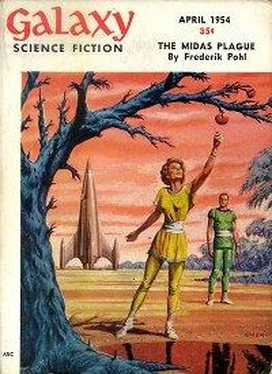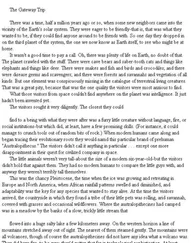Pohl Frederik - The Midas Plague
Здесь есть возможность читать онлайн «Pohl Frederik - The Midas Plague» весь текст электронной книги совершенно бесплатно (целиком полную версию без сокращений). В некоторых случаях можно слушать аудио, скачать через торрент в формате fb2 и присутствует краткое содержание. Год выпуска: 1954, Издательство: Galaxy Publishing Corporation, Жанр: Фантастика и фэнтези, на английском языке. Описание произведения, (предисловие) а так же отзывы посетителей доступны на портале библиотеки ЛибКат.
- Название:The Midas Plague
- Автор:
- Издательство:Galaxy Publishing Corporation
- Жанр:
- Год:1954
- ISBN:нет данных
- Рейтинг книги:5 / 5. Голосов: 1
-
Избранное:Добавить в избранное
- Отзывы:
-
Ваша оценка:
- 100
- 1
- 2
- 3
- 4
- 5
The Midas Plague: краткое содержание, описание и аннотация
Предлагаем к чтению аннотацию, описание, краткое содержание или предисловие (зависит от того, что написал сам автор книги «The Midas Plague»). Если вы не нашли необходимую информацию о книге — напишите в комментариях, мы постараемся отыскать её.
The Midas Plague — читать онлайн бесплатно полную книгу (весь текст) целиком
Ниже представлен текст книги, разбитый по страницам. Система сохранения места последней прочитанной страницы, позволяет с удобством читать онлайн бесплатно книгу «The Midas Plague», без необходимости каждый раз заново искать на чём Вы остановились. Поставьте закладку, и сможете в любой момент перейти на страницу, на которой закончили чтение.
Интервал:
Закладка:
Worse, was there something about the way the robots consumed the stuff that would give the whole show away? Some special wear point in the robot anatomy, for instance, that would rub a hole where no human’s body could, or stretch a seam that should normally be under no strain at all?
It was worrisome. But the worry was needless. When the report of survey came, Morey let out a long-held breath. Not a single item disallowed!
Morey was a success—and so was his scheme!
To the successful man come the rewards of success. Morey arrived home one evening after a hard day’s work at the office and was alarmed to find another car parked in his drive. It was a tiny two-seater, the sort affected by top officials and the very well-to-do.
Right then and there Morey learned the first half of the embezzler’s lesson: Anything different is dangerous. He came uneasily into his own home, fearful that some high officer of the Ration Board had come to ask questions.
But Cherry was glowing. “Mr. Porfirio is a newspaper feature writer and he wants to write you up for their ‘Consumers of Distinction’ page! Morey, I couldn’t be more proud!”
“Thanks,” said Morey glumly. “Hello.”
Mr. Porfirio shook Morey’s hand warmly. “I’m not exactly from a newspaper,” he corrected. “Trans-video Press is what it is, actually. We’re a news wire service; we supply forty-seven hundred papers with news and feature material. Every one of them,” he added complacently, “on the required consumption list of Grades One through Six inclusive. We have a Sunday supplement self-help feature on consuming problems and we like to—well, give credit where credit is due. You’ve established an enviable record, Mr. Fry. We’d like to tell our readers about it.”
“Urn,” said Morey. “Let’s go in the drawing room.”
“Oh, no!” Cherry said firmly. “I want to hear this. He’s so modest, Mr. Porfirio, you’d really never know what kind of a man he is just to listen to him talk. Why, my goodness, I’m his wife and I swear I don’t know how he does all the consuming he does. He simply—”
“Have a drink, Mr. Porfirio,” Morey said, against all etiquette. “Rye? Scotch? Bourbon? Gin-and-tonic? Brandy Alexander? Dry Manna—I mean what would you like?” He became conscious that he was babbling like a fool.
“Anything,” said the newsman. “Rye is fine. Now, Mr. Fry, I notice you’ve fixed up your place very attractively here and your wife says that your country home is just as nice. As soon as I came in, I said to myself, ‘Beautiful home. Hardly a stick of furniture that isn’t absolutely necessary. Might be a Grade Six or Seven.’ And Mrs. Fry says the other place is even barer.”
“She does, does she?” Morey challenged sharply. “Well, let me tell you, Mr. Porfirio, that every last scrap of my furniture allowance is accounted for! I don’t know what you’re getting at, but—”
“Oh, I certainly didn’t mean to imply anything like that! I just want to get some information from you that I can pass on to our readers. You know, to sort of help them do as well as yourself. How do you do it?”
Morey swallowed. “We—uh—well, we just keep after it. Hard work, that’s all.”
Porfirio nodded admiringly. “Hard work,” he repeated, and fished a triple-folded sheet of paper out of his pocket to make notes on. “Would you say,” he went on, “that anyone could do as well as you simply by devoting himself to it—setting a regular schedule, for example, and keeping to it very strictly?”
“Oh, yes,” said Morey.
“In other words, it’s only a matter of doing what you have to do every day?”
“That’s it exactly. I handle the budget in my house—more experience than my wife, you see—but no reason a woman can’t do it.”
“Budgeting,” Porfirio recorded approvingly. “That’s our policy, too.”
The interview was not the terror it had seemed, not even when Porfirio tactfully called attention to Cherry’s slim waistline (“So many housewives, Mrs. Fry, find it difficult to keep from being—well, a little plump”) and Morey had to invent endless hours on the exercise machines, while Cherry looked faintly perplexed, but did not interrupt.
From the interview, however, Morey learned the second half of the embezzler’s lesson. After Porfirio had gone, he leaped in and spoke more than a little firmly to Cherry. “That business of exercise, dear. We really have to start doing it. I don’t know if you’ve noticed it, but you are beginning to get just a trifle heavier and we don’t want that to happen, do we?”
In the following grim and unnecessary sessions on the mechanical horses, Morey had plenty of time to reflect on the lesson. Stolen treasures are less sweet than one would like, when one dare not enjoy them in the open.
But some of Morey’s treasures were fairly earned.
The new Bradmoor K-50 Spin-a-Game, for instance, was his very own. His job was design and creation, and he was a fortunate man in that his efforts were permitted to be expended along the line of greatest social utility—namely, to increase consumption.
The Spin-a-Game was a well-nigh perfect machine for the purpose. “Brilliant,” said Wainwright, beaming, when the pilot machine had been put through its first tests. “Guess they don’t call me the Talent-picker for nothing. I knew you could do it, boy!”
Even Howland was lavish in his praise. He sat munching on a plate of petits-fours (he was still only a Grade Three) while the tests were going on, and when they were over, he said enthusiastically, “It’s a beauty, Morey. That series-corrupter—sensational! Never saw a prettier piece of machinery.”
Morey flushed gratefully.
Wainwright left, exuding praise, and Morey patted his pilot model affectionately and admired its polychrome gleam. The looks of the machine, as Wainwright had lectured many a time, were as important as its function: “You have to make them want to play it, boy! They won’t play it if they don’t see it!” And consequently the whole K series was distinguished by flashing rainbows of light, provocative strains of music, haunting scents that drifted into the nostrils of the passerby with compelling effect.
Morey had drawn heavily on all the old masterpieces of design— the one-arm bandit, the pinball machine, the juke box. You put your ration book in the hopper. You spun the wheels until you selected the game you wanted to play against the machine. You punched buttons or spun dials or, in any of 325 different ways, you pitted your human skill against the magnetic-taped skills of the machine.
And you lost. You had a chance to win, but the inexorable statistics of the machine’s setting made sure that if you played long enough, you had to lose.
That is to say, if you risked a ten-point ration stamp—showing, perhaps, that you had consumed three six-course meals—your statistic return was eight points. You might hit the jackpot and get a thousand points back, and thus be exempt from a whole freezerful of steaks and joints and prepared vegetables; but it seldom happened. Most likely you lost and got nothing.
Got nothing, that is, in the way of your hazarded ration stamps. But the beauty of the machine, which was Morey’s main contribution, was that, win or lose, you always found a pellet of vitamin-drenched, sugarcoated antibiotic hormone gum in the hopper. You played your game, won or lost your stake, popped your hormone gum into your mouth and played another. By the time that game was ended, the gum was used up, the coating dissolved; you discarded it and started another.
“That’s what the man from the NRB liked,” Howland told Morey confidentially. “He took a set of schematics back with him; they might install it on all new machines. Oh, you’re the fair-haired boy, all right!”
Читать дальшеИнтервал:
Закладка:
Похожие книги на «The Midas Plague»
Представляем Вашему вниманию похожие книги на «The Midas Plague» списком для выбора. Мы отобрали схожую по названию и смыслу литературу в надежде предоставить читателям больше вариантов отыскать новые, интересные, ещё непрочитанные произведения.
Обсуждение, отзывы о книге «The Midas Plague» и просто собственные мнения читателей. Оставьте ваши комментарии, напишите, что Вы думаете о произведении, его смысле или главных героях. Укажите что конкретно понравилось, а что нет, и почему Вы так считаете.












